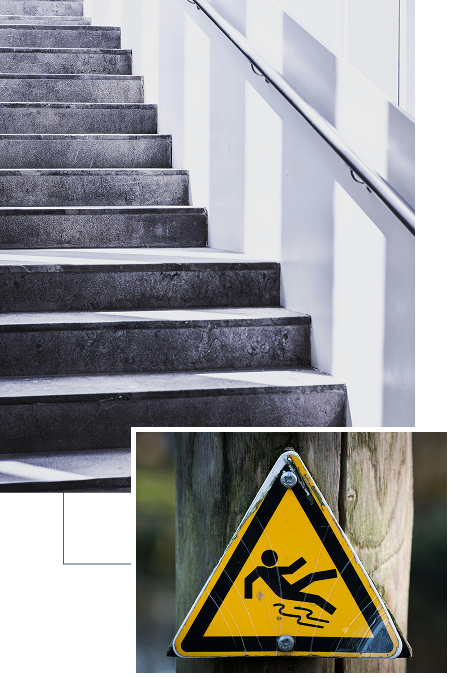Occupiers’ Liability Lawyers in Ontario
Serving all cities including Toronto, North York, Barrie, Hamilton, Sudbury and North Bay.
Who We Are


Why You Need an Occupiers’ Liability Lawyer
Accidents caused by hazardous property conditions can have lasting effects, from physical injuries and lost income to emotional distress and costly medical bills.
Ontario’s Occupiers’ Liability Act imposes a legal duty on occupiers to ensure their premises are safe, but proving negligence and liability requires detailed investigation and legal expertise.
At Oatley Vigmond, we handle the complex legal requirements and deadlines, including understanding the standards occupiers must meet and how contributory negligence may impact your claim under Ontario law. We collaborate with medical professionals and experts to build a strong case and negotiate with insurance companies who often attempt to minimize payouts.
By trusting us with your claim, you gain an advocate who is committed to protecting your rights and fighting to obtain fair compensation for your injuries and losses.
Personal Injury Awards
Oatley Vigmond is a leading personal injury law firm, trusted for our expertise, advocacy, and proven results. Our team of lawyers and accident benefits specialists provide steadfast support to those facing catastrophic injuries, delivering the highest standard of representation to help clients rebuild their lives.






Types of Occupiers' Liability Cases We Handle

Injuries from inadequate maintenance or defective stairs and railings

Falls due to poor lighting or obstructed walkways

Accidents involving falling objects or unsafe fixtures

Injuries on commercial or retail properties

Hazards on construction sites or private residences

Accidents caused by lack of warning signs for known dangers
FAQ for Occupiers’ Liability Lawyers
What Are The Most Common Injuries in Occupiers’ Liability Cases?
In occupiers’ liability cases, injuries can vary widely depending on the nature of the hazard and the circumstances of the accident. Some of the most common injuries include:
- Fractures and broken bones: often caused by slips, trips, and falls on uneven or slippery surfaces.
- Head injuries and concussions: resulting from falls or objects falling from a height.
- Spinal cord injuries: which can lead to partial or complete paralysis.
- Soft tissue injuries: such as sprains, strains, and torn ligaments.
- Cuts and lacerations: sometimes requiring stitches or leaving permanent scars.
- Burns: from exposure to hot surfaces, liquids, or chemicals.
- Internal injuries: including organ damage from falls or blunt force trauma.
These injuries often require extensive medical care and may lead to long-term physical, emotional, and financial consequences.
How Much Are Occupiers’ Liability Settlements?
Do I Really Need a Lawyer After an Occupiers’ Liability Injury?
What If I Am Partially At Fault in an Occupiers’ Liability Case?
Under Ontario’s law, fault can be shared. Even if you bear some responsibility for the accident, you may still recover compensation, although it might be reduced in proportion to your degree of fault. Our team carefully reviews your case to minimize the impact of contributory negligence and maximize your recovery.
Contact us today for a free consultation. Let us evaluate your situation and provide the skilled advice you need.
Related Insights

Oatley Vigmond Establishes Education Fund in Memory of Longtime HSN Employee Carol DiSalle
View the original article at: https://hsnfoundation.com/news-events/oatley-vigmond-establishes-education-fund-in-memory-of-longtime-hsn-employee-carol-disalle/ Health Sciences North (HSN) and the HSN Foundation are honoured to announce a generous gift from Oatley Vigmond Personal Injury Lawyers LLP, who have

How Does Social Media Affect an Insurance Claim?
Everyone who advances a significant personal injury or disability claim should know that the insurance company will review all social media sites to obtain information on the person making the

What happens if you’re injured in a car accident outside Ontario?
If you’re an Ontario resident involved in a motor vehicle accident (“MVA”) while traveling – whether in Canada of the United States – you might wonder whether your auto insurance
